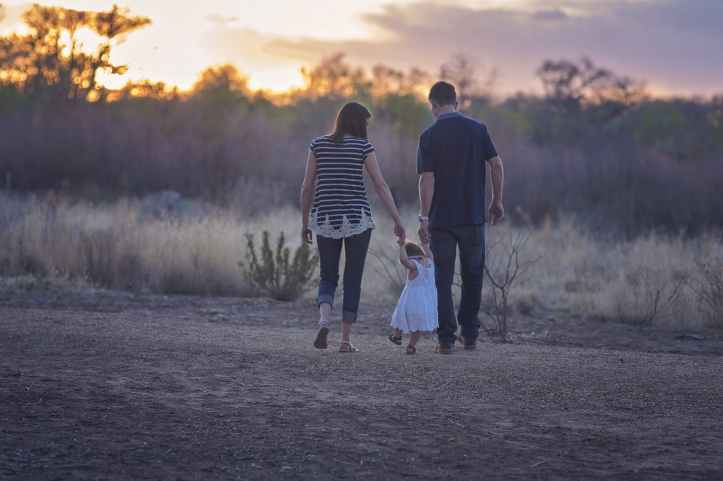
About two weeks before the film Instant Family (a heartwarming movie about a couple who become foster parents) was released in theaters, I was in a crowded airport “enjoying” a three-hour layover in Atlanta on my way to New York to see my sister.
While in the longest line for what seemed like the most crowded women’s bathroom ever, I noticed a toddler having the quite the challenge of pulling her little roller suitcase behind her. The mom was urging her child through the walkway but had more luggage and children in her own hands; the family was blocking the way of other travelers, and the parent was visibly stressed.
The mom couldn’t see that the little girl was dragging her suitcase wheels up, which is why she was having such a hard time pulling it across the tiled floor. Essentially, this toddler was attempting to pull her own weight by a small handle. However, the toddler didn’t realize that all she had to do was flip her suitcase around so that the wheels touched the floor—and then her task would be practically effortless.
My heart went out to the little girl and the mom, both who had their hands full, and I reached down to assist. “Do you need some help? Here, I can help you,” I said smiling as I kneeled to attempt to help flip the suitcase. The toddler looked at me with that smart sense of stranger danger. Then the mom realized at once what had happened with the luggage, thanked me, and assisted her daughter the rest of the way.
The next thing that happened was kind of unusual.
Two women behind me in line who were traveling together started to laugh that the girl didn’t want my help because of stranger danger (again, a wise thing on the toddler’s part!). I laughed along and agreed with them—and through giggles and with the hint of self-depreciating humor, I mentioned I had been a foster parent and, knowing what it’s like to live with young children, couldn’t stop myself from helping when another child or parent was having a tough time, even with the simple task of reorienting carry-on luggage (that, and there’s something about all those years being the eldest of five children and having lots of nanny experience that makes you feel drawn to help kids/parents out when they’re having a tough time).
Oddly, the person I was talking with in line would no longer make eye contact with me after I mentioned the words foster parent, which made me feel a bit like I had done or said something wrong. In that moment, it seemed that I was the epitome of stranger danger to this person, and they quickly cut off our small talk.
After the extensive training that foster parenting requires and the horror stories that I’ve heard, I know that many people who grew up in foster care have experienced terrible, unspeakable, and unjust trauma at the hands of their foster parents. In fact, according to an unsettling report by Liftingtheveil.org, a New York University School of Social Work study found that in New York State alone, over 28% of children in state care had been abused while in the system. So I understand that many people don’t have warm feelings toward those who choose to become parents in this way.
But this got me thinking: This idea of “stranger danger” is exactly what prevents a lot of healthy Christian families* who could provide stable, caring homes to children in their greatest time of need from becoming foster parents in the first place.
When my husband and I were seeking to get certified as foster parents, we got a lot of comments:
“What about their parents? Many are drug addicts you know.”
“Aren’t their biological parents and families criminals and in jail? What if they come after you?”
“How can you handle so many strangers and social workers coming in and out of your home? I would feel judged all the time.”
It’s good to know your limits, and foster parenting truly isn’t for everyone. It’s a calling from the Lord, and the people who do it best are those who have the passion and energy to advocate for children and families in need. I say families because having empathy and Christ-like grace toward the people and places your foster children come from is key to loving and serving both children and their parents well.
However, although stranger safety is unfortunately a very real thing we need to teach our children to keep them safe in this world, as adults, let’s not be so afraid of other people who are not like us that we don’t welcome them into our circles—and even into our homes—showing Christ-like hospitality to those in need.
In The Gospel Comes With a Housekey, a beautiful book about the radical hospitality that Christians should live out in their immediate communities, Rosaria Butterfield says this: “Christians are called to practice radically ordinary hospitality to renew their resolve in Christ. Too many of us are sidelined by fears. We fear that people will hurt us. We fear that people will negatively influence our children. . . . We long for days gone by. Our sentimentality makes us stupid. We need to snap ourselves out of this self-pitying reverie. The best days are ahead. Jesus advances from the front of the line.”
As Christians, whether we have a calling to open up our home to foster children or not, we should be willing—eager even—to associate with and love those who are different than us. Maybe even people who may seem kind of “scary” to us at first. We might even be afraid of what our biological children might experience if we bring outsiders into the family equation (maybe they’ll rightly experience being the hands and feet of Jesus and living out the Gospel? but that’s just me).
Yes, there’s risk, but Christ himself says in John 14:27 (ESV): “Peace I leave with you; my peace I give to you. Not as the world gives do I give to you. Let not your hearts be troubled, neither let them be afraid.” And in 2 Thessalonians 3:3 we’re told that “the Lord is faithful. He will establish you and guard you against the evil one.”
There is no need to fear doing good. Obviously, we should use wisdom and discernment from the Holy Spirit when making decisions to invite strangers into our lives, but the Lord provides us exactly what we need to accomplish his will—including protection. If you feel a tug at your heart to become a foster parent, open up your home to the homeless, or help people in crisis, never let fear get in the way.
Yes, teaching children about stranger danger is important. It’s valuable and vital and we shouldn’t stop doing it—and I’ll be teaching it to any and all children in my home. But as grown, discerning adults, let’s not allow our cultural fear of strangers keep us from loving those who we are called as Christ followers to love: widows, orphans, refugees, our next-door neighbors, those in poverty, victims of sex trafficking, those suffering with addiction or physical, mental, and spiritual health issues—the list could go on.
How much safer and more stable would the foster system be if more grounded, healthy, open, wise and loving families served as foster parents?
What if, when an airport stranger heard someone was a foster parent, that phrase was automatically associated with integrity, safety, and the highest selfless concern for child welfare?
I know there are a lot of reasons why foster parenting might not be a good fit for a household, and again, as I mentioned before, it truly isn’t for everyone and that’s okay. But if we feel that pull on our hearts to serve children and their families in that way, let us be the hands and feet of Jesus.
If more passionate, brave, and healthy Christians became foster families, the entire system would be drenched in the love and power of Christ—and what a wonderful thing that would be.
“For I was hungry and you gave me food, I was thirsty and you gave me drink, I was a stranger and you welcomed me, I was naked and you clothed me, I was sick and you visited me, I was in prison and you came to me.” — Matthew 25:35–36
“Therefore welcome one another as Christ has welcomed you, for the glory of God.” — Romans 15:7
* I should clarify what I mean by “healthy Christian families.” When I use this phrase, I mean a household that contains a healthy and joyful marriage or a healthy, joyful, supported single parent who strives to live their life laying themselves down for others like Christ does. “Healthy Christian families” would also include Christian individuals/families who believe in the power of mental healthcare and medicine, who are not afraid of the judgement of others and do not live to please man, and are full of mercy, grace, and humility toward people who do not live, look, act, or think like they do. Although no marriage, family, or Christian is “perfect” or could ever be, a healthy Christian family would be marked by love and grace and free from emotional abuse or manipulation.
And I most certainly should note that someone who uses their faith to manipulate and control the behavior and feelings of others, especially children, would not be considered a healthy Christian. You’d be surprised by the stories of what “Christian” families have done or said to foster children in the name of faith while they were in their care.
If you liked this post, you might also like:

You are an amazing person, Amanda! Not just for opening up your home as a foster parent but for going the extra step and loving them in the way Christ loves them. You and Nick are an inspiration!
Thank you so much for reading, Betsy! When we had foster kids in the home, we did our best to love them that way, but of course we’re human and fell short at times, especially when we had a difficult placement. Thankfully, Christ’s grace is sufficient for us—and for those kiddos. I’m just bummed we’ve had to put foster parenting on pause for the move and all these life changes, because there is SUCH a need for loving homes while kids are in foster care! Hoping to jump back in as soon as we’re able. 🙂
Yes to all of this!! Loving and serving foster children and their families has been one of the best ways our family has found that we can all minister together – and one of the only ways we have found to pop our suburban insulation-bubble and interact with people with radically different needs from ours.
Becka, love that so much! With one of our foster children, we even found that we received so much grace and love from their family. It was humbling and overwhelming and a beautiful picture of mutually receiving and giving. When we fostered, we were in a socioeconomically diverse metro area, and it was clear to see all the needs in our direct community. I love that fostering has helped “pop that bubble” and put you in touch with different kinds of families. It’s so important as Christians! I can’t wait to foster again once we’re settled in our new state and have built up a support system. Thanks for reading!
[…] Stranger Danger: Why So Many Healthy Christian Homes Don’t Become Foster Parents […]
[…] Stranger Danger: Why So Many Healthy Christian Homes Don’t Become Foster Parents […]